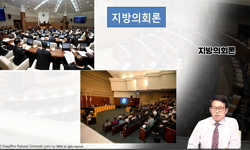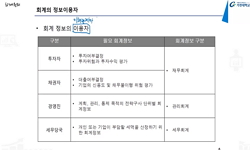1. Introduction 2. Regional Information Systems Policy 1) The Concept of Regional Information Systems Policy 2) National Information Policy in Korea 3) Organizational Arrangements 3. Relationship between Local Council an...
http://chineseinput.net/에서 pinyin(병음)방식으로 중국어를 변환할 수 있습니다.
변환된 중국어를 복사하여 사용하시면 됩니다.
- 中文 을 입력하시려면 zhongwen을 입력하시고 space를누르시면됩니다.
- 北京 을 입력하시려면 beijing을 입력하시고 space를 누르시면 됩니다.
The Role of Local Council for the Effective Regional Informatization : The Seoul Metropolitan Government Case
한글로보기https://www.riss.kr/link?id=G3605084
- 저자
- 발행기관
-
발행연도
2000년
-
작성언어
English
- 주제어
-
자료형태
한국연구재단(NRF)
-
0
상세조회 -
0
다운로드
부가정보
다국어 초록 (Multilingual Abstract)
2. Regional Information Systems Policy
1) The Concept of Regional Information Systems Policy
2) National Information Policy in Korea
3) Organizational Arrangements
3. Relationship between Local Council and Local Government
1) Political Influence on the Bureaucracy
2) Local Council and Regional Information Policy
3) Citizens and Local Council
4. Informatization in the Seoul Metropolitan Government
1) Information Policy in the Seoul Metropolitan Government
2) Case: Online Procedures Enhancement for Civil Application
3) The Mission of the Seoul Metropolitan Council
5. Role of Local Council: A Principal-Agent Perspective
1) Principal-Agent Model
2) Information Asymmetry between Politicians and Bureaucrats
3) Local Council's Strategies to Solve Agency Problems
6. Conclusion: The Role Model of SMC
1. Introduction
2. Regional Information Systems Policy
1) The Concept of Regional Information Systems Policy
2) National Information Policy in Korea
3) Organizational Arrangements
3. Relationship between Local Council and Local Government
1) Political Influence on the Bureaucracy
2) Local Council and Regional Information Policy
3) Citizens and Local Council
4. Informatization in the Seoul Metropolitan Government
1) Information Policy in the Seoul Metropolitan Government
2) Case: Online Procedures Enhancement for Civil Application
3) The Mission of the Seoul Metropolitan Council
5. Role of Local Council: A Principal-Agent Perspective
1) Principal-Agent Model
2) Information Asymmetry between Politicians and Bureaucrats
3) Local Council's Strategies to Solve Agency Problems
6. Conclusion: The Role Model of SMC
국문 초록 (Abstract)
효과적인 지역정보화정책 추진을 위해서는 정부만의 주도적인 정책의지에 덧붙여서 지역주민의 의사가 충분히 반영되어야 한다는 것이다. 주역주민의 의사는 다양한 경로를 통해 이루어지...
효과적인 지역정보화정책 추진을 위해서는 정부만의 주도적인 정책의지에 덧붙여서 지역주민의 의사가 충분히 반영되어야 한다는 것이다. 주역주민의 의사는 다양한 경로를 통해 이루어지나 가장 강력하고 직접적인 행정부 통제는 의회를 통하는 방식이라고 볼 수 있다. 그러나 현재 한국의 지역정보화 정책은 중앙정부의 역할이 지방정부보다 훨씬 강조되고 있다. 뿐만 아니라 지역수준에서도 정부주도로 대부분 이루어지고 있고 지방의회의 역할은 미흡한 실정이다. 그러므로 효과적인 지역정보화추진을 위해서는 주민들의 의사를 수렴하는 지방의회의 보다 적극적이며 선도적인 역할을 필요로 한다. 본 연구는 향후 지향해야 할 지방의회의 역할모델은 다음과 같이 messenger(주민의사 전달자), watchdog(지역정보화정책 감시자), advocate(주민의사 옹호자), pioneer(지역정보화 선도자)로 설정하였다.
다국어 초록 (Multilingual Abstract)
Information society has come to people with dual faces: messiah and monster. While information and telecommunication technology has remarkably contributed to set free from human drudgery, it also makes people frustrated in many cases. Regional informa...
Information society has come to people with dual faces: messiah and monster. While information and telecommunication technology has remarkably contributed to set free from human drudgery, it also makes people frustrated in many cases. Regional informatization is an attempt to reduce the interregional information gap. The information policy in a local level should be based on the citizens' interests. Nevertheless, either central or local bureaucracy has exclusively driven the information policy in Korea. Therefore, one can easily turn to the role of local council that has the mission to articulate the various voices of its constituents. In order to clearly identify the focal issues, this paperfocuses on the problem of information asymmetry between bureaucrats and politicians, on the basis of the principal-agent theory. After analyzing the case of the Seoul Metropolitan Government(as an agent) and the Seoul Metropolitan Council(as a principal), this study suggests that the local council should play a key role as messenger, watchdog, advocate, and pioneer. Lastly, it also proposes that the Seoul Metropolitan Council should form an Information and Telecommunication Committee as a Standing Committee so that it can effectively manage and monitor the regional informatization.








